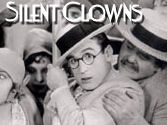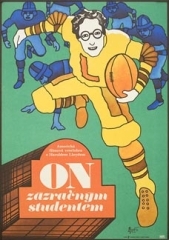SAFETY LAST
(1923)With Harold Lloyd, Mildred Davis, Noah Young, Bill Strothers
Directed by Fred Newmeyer and Sam Taylor
Silent, Black and White
Reviewed by JB
 Harold Lloyd hanging onto the hands of a
clock on the side of a tall building has come down through the decades
as one of the most iconic images of the century. SAFETY LAST, the film
from which this image comes, is not nearly as well known
these
days, A shame, since SAFETY LAST is one of the masterpieces
of
silent comedy.
Harold Lloyd hanging onto the hands of a
clock on the side of a tall building has come down through the decades
as one of the most iconic images of the century. SAFETY LAST, the film
from which this image comes, is not nearly as well known
these
days, A shame, since SAFETY LAST is one of the masterpieces
of
silent comedy.
It may not be as poignant as CITY LIGHTS, or as fascinating to watch as THE GENERAL, but, in terms of laughs per foot, SAFETY LAST is equal to any of those masterworks by Chaplin or Keaton. The story is simple and typical Lloyd fluff - a small town boy promises his girl he will be a success in the Big City, and then fails to live up to that promise, until, of course, the final moments of the film. But from beginning to end, Lloyd and his writers manage to fill every scene and sequence of this simple story with the maximum number of gags possible. The film is jam-packed with the kind of clever, intelligent and surprising visual comedy that make you forget within seconds that you are watching a silent movie made nearly a century ago. Standout sequences include Harold's attempt to board a train to the big city, a near riot on Sale Day in the department store Harold works at, and, of course, the climax, in which Harold is forced to climb up a twelve story building. It is a beautifully shot and edited sequence, still capable of producing laughs and gasps, and is justly famous, but it is not even Lloyd's best film finale. For that, you have to see GIRL SHY and Harold's amazing race to the church to stop the girl he loves from marrying a bigamist.
Sharp-eyed fans of
classic comedy should look
quick for young Mickey Daniels, then the leader of producer Hal Roach's
Our Gang,
and for one
intertitle, written by H.M. Walker, which was later recycled for a
Laurel and Hardy sound short. ("One pocketbook between them
---
always empty.")  - JB
- JB


